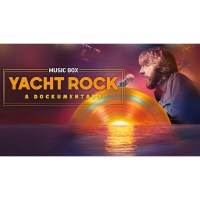
 The best-realized episode of 2022’s Sometimes When We Touch, the three-part Paramount Plus documentary on late ‘70s/early ‘80s soft rock was its final installment. That segment was the one covering Yacht Rock, powered by interviews from Michael McDonald and Kenny Loggins, as well as Steve Huey and Dave Lyons, who helped retroactively define the subgenre with their YouTube series.
The best-realized episode of 2022’s Sometimes When We Touch, the three-part Paramount Plus documentary on late ‘70s/early ‘80s soft rock was its final installment. That segment was the one covering Yacht Rock, powered by interviews from Michael McDonald and Kenny Loggins, as well as Steve Huey and Dave Lyons, who helped retroactively define the subgenre with their YouTube series.
You might reasonably wonder what content, or viewer enthusiasm, is left two years later for Yacht Rock: A DOCKumentary, which just premiered on HBO as part of Bill Simmons’ Music Box series. But the YouTube series is nearly 20 years old, outlasting the 1975-83 span of hits involved by a factor of three. Broadcasters and non-industry listeners still seem to enjoy complaining anew each summer that the playlist of SiriusXM’s Yacht Rock Radio is somehow both too tight and too permissive in its definition of the genre.
As it turns out, Yacht Rock: A DOCKumentary is generating just as much excitement among social media friends as HBO’s The Bee Gees: How Can You Mend a Broken Heart did four years ago. I’m hearing more about it than I did about the Paramount Plus series, and far more than the just-released Beatles ’64.
In some ways, the question might be what there is left to say about DOCKumentary itself, even four days after its premiere. Many radio programmer friends have already seen it, and their feedback has been uniformly positive. Record industry blogger Bob Lefsetz has already dismissed it as skin deep and “pretty terrible.” Lefsetz bemoans the amount of screen time given to current artists and rock critics, a frustration of many documentaries.
DOCKumentary is best viewed as the Yacht Rock Weekend on a Classic Hits or Mainstream Adult Contemporary radio station. It benefits from even-more-in-depth interviews from McDonald and Loggins, along with Christopher Cross, the surviving Toto members, as well as Huey and Yacht Rock co-creator JD Ryznar.
For at least an hour of the 96-minute run-time, DOCKumentary is hit-after-hit with origin stories for most of the genre’s biggest acts and anthems, even the story of McDonald and Loggins writing “What a Fool Believes” together, familiar from Sometimes When We Touch gets a new kicker.
Many of the comments about DOCKumentary so far center on McDonald’s inherent “good guy” qualities. Cross talks about McDonald’s star-making willingness to guest on “Ride Like the Wind” before they had even met. Eventually, McDonald’s generosity with guest appearances would become the shared DNA of the entire genre.
DOCKumentary is also determined to force a re-evaluation of Cross, including Huey explaining why Yacht Rock can absolutely encompass both him and Steely Dan. DOCKumentary goes to such lengths to redefine Cross as badass—he once filled in on stage for Deep Purple’s Richie Blackmore; he financed his debut album by selling weed; he wrote “Ride Like the Wind” on acid—that it’s practically like the exaggerated comic personas that the YouTube series created for the genre’s other stars at the time.
DOCKumentary also acknowledges, but barely has time to unpack, the relationship between Yacht Rock and the R&B that both helped inspire it (a central tenet of its creators’ definition) and was almost entirely driven from pop radio in the early ‘80s. Critic Jason King does point out that the artists who did manage to have pop hits then—George Benson, Al Jarreau, Grover Washington, Jr., the Pointer Sisters—were mostly those who chose to make Adult Contemporary music themselves.
Brenda Russell, one of the movie’s best interviews, talks about making music that almost perfectly fits the genre as we define it now, but had a hard time finding a place at pop or R&B at the time. DOCKumentary also goes to lengths to point out that acts like Steely Dan or McDonald earned the respect of R&B listeners either through reverse radio crossover at the time or Hip-Hop sampling later, but fully getting at the complexity of the relationship is a future documentary or podcast episode unto itself.
That said, every Yacht Rock discussion turns to what is and isn’t included. It didn’t surprise me when somebody online asked “where’s the Little River Band?” But the Wall Street Journal asks why there’s nothing about Little Feat (not because we think of them as Yacht Rock, but because the reviewer thinks they belong in any discussion of Christopher Cross). But the interviews make DOCKumentary satisfying in what it does cover.
DOCKumentary wraps up the era as Yacht Rock’s creators do, with McDonald’s 1986 comeback “Sweet Freedom.” By that time, however, Top 40 was already well into another wave of soft rock—Steve Winwood, Mr. Mister, Mike + the Mechanics, Bruce Hornsby, Dream Academy, etc. —some of it also ticking the R&B/jazz-inspired or “driven by former studio musicians” boxes. In the aggregate, it was a glut of quality music that still managed to dampen the excitement that had been Top 40 during its 1983-85 dominance.
Mellow returns to pop music at odd intervals and not just as nostalgia. In 2050, the often off-kilter music that younger listeners chill out to now will likely be somebody else’s documentary. The parameters of “Yacht Rock” are well-established enough that we now know a nautical title isn’t enough for inclusion. But it can’t be ignored that mellow’s latest left-field chart incursion is called “Sailor Song.”
